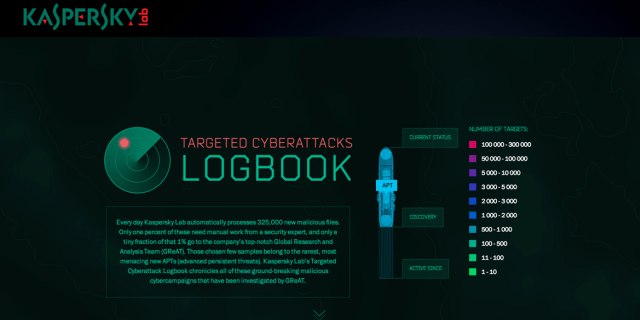
Year 2014 in security: looking back over one’s shoulder
2014 is over, as are the holidays. Time to look back at the business security highlights of past the year.
1247 articles

2014 is over, as are the holidays. Time to look back at the business security highlights of past the year.

A third-party plugin for WordPress CMS – RevSlider – made vulnerable up to 100K WordPress-based sites, with more than 10K blocked by Google for re-distributing malware they fell victims prior

Shellshock bug proved to be “wormable”, and is exploiting the vulnerable network attached devices (by QNAP at least), scanning for more potential victims. While it is not exactly a Christmas

The number of corporate-targeting attacks increased this year more than two times compared to 2013. Why?

A new malware hits banks and their clients worldwide. Codenamed Chthonic, it is actually an evolved version of notorious Zeus banking Trojan.

2014 was marked by a streak of major cyberattacks on large retailers in the US. In most cases, PoS malware was at play. Now retailers are scrambling to improve their Point-of-Sale terminal security. It’s encouraging, but a pity that it took so long.

Kaspersky Lab launches “Targeted Attacks Logbook” – a visual tool to monitor known Advanced Persistent Threats. In this post, we take a look at how to handle this pretty instrument.

Kaspersky Lab experts unveiled new Linux-targeting malware related to the infamous Turla APT. Such modules were known to exist before, but never met in the wild. Until now.

The RedOctober operation was hastily wrapped-up just after a Kaspersky Lab’s publication in January 2013, but it was expected to return. And it did.

Yesterday, Kaspersky Lab hosted the ‘Emerging Threats in the APT World: Predictions for 2015’ webinar. Special thank you to everyone who joined our discussion on how APTs will evolve in the coming year.

Kaspersky Lab experts shared their predictions on the evolution of APT. While these predictions may not come true, they are based on facts and trends already observed.

Sony Pictures Entertainment fell victim to a massive hack. Attackers used destructive malware to bring SPE networks down, while stealing up to 11 TB of data, which included both trade secrets, yellow press fodder, passwords to social networks accounts, and a lot of private information.

Ransomware is a common and much-feared problem. Here are ten facts to help in dealing with it.

Kaspersky Lab has gathered stats on the cyberthreats in 2014. The figures are appalling, but they don’t spell out doom and gloom. It is all about awareness.

Costin Raiu, director of Kaspersky Lab’s Global Research and Analysis Team (GReAT) will be sharing his expert team’s predictions for 2015 during a special webinar on December 11. The predictions

Electronic devices becoming so smart that they take over mankind is a recurring theme in sci-fi. Chronophobia and futurophobia are widespread, too. But what’s the point of being afraid? Security in the coming age of Smarternet requires awareness and attention.

There are some good reasons to spend years researching high-profile cyberthreats. But we do our best to protect our customers from the latest threats even before the investigation has concluded. Here’s how.

Disgruntled ex-employees don’t need to have special hacking skills to inflict severe damage on the company infrastructure. Cynthia James reviews a number of scenarios, and ways to prevent attacks of this kind.

Cybercrime is a rather lucrative business. Cybercriminals are earning a lot, or at least their effort-to-profit rate is good enough for them to keep going. But how good is it?

Online games these days are products of years of development with budgets approaching those in Hollywood, and with similar marketing support. And if we speak of massively multiuser online games
